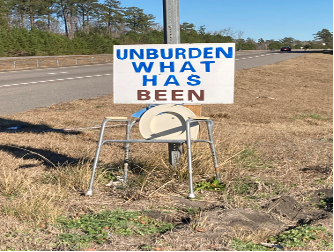It was like most mornings; a brisk walk in the local nature preserve, downing the last drop of coffee, and heading off on whatever adventure I could create for myself before settling in for the day.
Like what you are reading? For more stimulating stories, thought-provoking articles and new video announcements, sign up for our monthly newsletter.
On the way out of the preserve is a very homemade road sign, one I pass so frequently it has blended almost imperceptibly into the surroundings. I remember questioning its purpose the first time I saw it, saying something to myself like, “gotta be a religious statement.” It checked all my boxes for a roadside reminder of God’s ubiquitous presence in our lives: simple statement, homemade sign, profound deeper meaning (if a passerby chose that option)—check, check, check!
Unburden What Has Been
“Unburden What Has Been,” it boldly proclaimed, standing out in sharp contrast to its brown wintery surround. For whatever reason, on that particular penultimate day of the year, I looked down (instead of up to the heavens), and boy howdy was I surprised by what was holding up that sign. A portable commode! A damn potty chair.
Unburden what has been! Donning my clinician’s cap, I thought, “so simple in theory, but so hard in practice,” regardless of which side of the couch you are on. Although for now, I’ll position myself on the clinical side of that couch and ask myself—and you—to look beneath the common factors that undergird successful psychotherapy for the ur-factor, that one therapeutic ring to rule them all. Yes, yes, perhaps a bit reductionistic, but no more so than that fateful sign that birthed this musing.
The goal of psychoanalysis is to penetrate the unconscious and its myriad of defenses to free repressed thought and emotion so the patient can have full insight into and resolve conflict. Unburdening in its fullest form.
The goal of Cognitive-Behavior Therapy is to release the client from the torturous grip of self-defeating thoughts and repressive behavioral patterns, so the client can finally achieve freedom (and dignity?!). Unburdening, once again.
The goal of Rogerian treatment is to use the presence and person of the therapist to close the gap between the client’s ideal and actual self so they may become more fully functioning. I imagine there is no better state of unburdened(hood) than that.
And what about the goal of Narrative Therapy? Isn’t it to unburden the client from the pre-scripted demands of their self-defeating stories that were often created in systems of oppression? And then of course, there are the Systemic Therapies, a more challenging venture, where the goal is to cancel out the noise, empty out the closets, and shoo away the ghosts, so couples and family members can peacefully, safely, and lovingly co-exist. A shared unburdening project.
I could go on. . . but in short, we clinicians, regardless of therapeutic orientation and methods, are all in the business of helping our clients, our patients, or in the words of Irvin Yalom, fellow travelers, to slow down, take a breath, look inside and around, and unburden themselves.
A worthy goal, not one so easily achieved, but definitely one worth the journey—one I’m reminded of every time I walk through that nature preserve.
Questions for Thought and Discussion
Can you think of an incidental inspiration such as this one that has impacted your clinical thought or practice?
What do you think are some of the common factors in therapy that drive your own practice?
Can you think of a client with whom you've worked that has deepened your appreciation for the power of unburdening in therapy?
File under: A Day in the Life of a Therapist, Musings and Reflections






